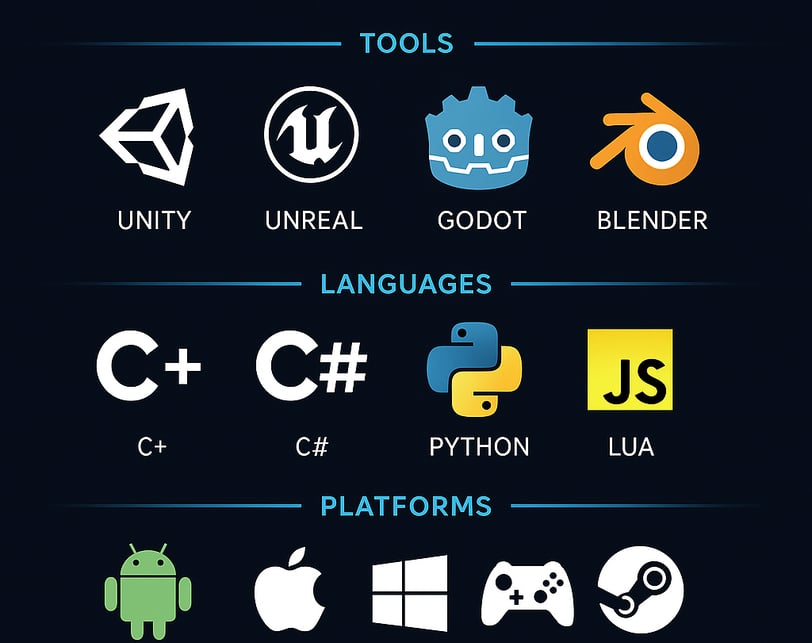Game Development
Explore the world of game development—from concept and design to programming and launch. Learn about popular tools, engines, real-world applications, and what the future holds in this evolving digital craft.
4 min read


🎮 Game Development
What is Game Development?
Game development is the complete process of designing, building, and releasing interactive digital games. It combines creativity and technology to craft experiences that can entertain, teach, or immerse players in entirely new worlds. Whether it’s a simple puzzle app on a smartphone or a cinematic adventure on a gaming console, game development covers everything from concept creation to the final playable product.
At its core, game development involves multiple disciplines working together: storytelling, programming, visual design, music composition, psychology, and user experience. Each of these elements contributes to how a game feels and functions. When done right, games have the power to evoke emotion, develop skills, and even bring communities together across the globe.
Why is Game Development Important?
Gaming is no longer just a pastime for a niche audience—it’s a major global industry influencing education, entertainment, health, business, and even social change. Through gamification, we now see game mechanics in classrooms, fitness apps, and even workplace productivity tools.
Beyond fun, games serve as platforms for storytelling, emotional exploration, and even simulation-based training. From pilots using realistic flight simulators to students using educational games to learn science, game development plays a vital role in modern life.
🛠️ The Game Development Process
Game development is not a single step but a lifecycle that evolves through different phases. Each phase requires distinct skills and collaboration between designers, developers, artists, and testers.
1. Concept & Ideation
This is the spark—the initial idea. What kind of game is it? What is its goal? Is it a side-scrolling platformer, a 3D open world, or a mobile trivia app? This phase also involves market research to ensure the idea resonates with the target audience.
2. Design & Pre-Production
Game designers plan the game mechanics (rules, physics, rewards, difficulty levels) and user experience. Storylines, characters, levels, and gameplay logic are sketched out. Artists create concept art and mood boards.
3. Development
This is the programming stage. Game developers write code using game engines to implement features, mechanics, and interactions. Developers bring characters to life, control how players interact with the game world, and build core systems like AI, physics, and movement.
4. Testing & Debugging
Games must be thoroughly tested to ensure there are no bugs, glitches, or balance issues. This includes functional testing (do things work?), performance testing (does it run smoothly?), and user feedback (is it fun?).
5. Launch
Once complete, the game is released on platforms such as Steam, PlayStation, Xbox, App Store, or Google Play. Marketing, trailers, and community engagement become key.
6. Post-Launch Support
After release, developers often release patches, updates, downloadable content (DLC), or expansions to improve and grow the game based on player feedback.
🧱 Game Engines and Tools
Game engines are software frameworks used to create and develop games efficiently. They handle much of the heavy lifting—graphics, physics, input handling—allowing developers to focus on gameplay and story.
⚙️ Popular Game Engines:
Unity: Highly versatile, widely used for mobile and indie games. Uses C#.
Unreal Engine: Known for high-end visuals and realistic environments. Uses C++ and Blueprints (a visual scripting tool).
Godot: Open-source engine with a user-friendly interface. Great for beginners and supports both 2D and 3D.
GameMaker Studio: Ideal for 2D games, especially for newcomers.
🧩 Supporting Tools:
Blender: 3D modeling, rigging, and animation.
Photoshop / GIMP: Art and texture design.
Audacity / FMOD: Sound editing and audio engineering.
Trello / Notion / Jira: Project management and team collaboration.
💻 Programming Languages in Game Development
Depending on the engine and platform, different languages are used:
C# – Widely used with Unity.
C++ – Standard for performance-heavy AAA games.
Python – Great for prototyping or educational purposes.
JavaScript – Often used in browser-based games.
GDScript – Python-like language used with Godot.
Each language plays a role in controlling gameplay logic, animations, user inputs, and physics systems.
🎮 Types of Games by Genre
Understanding the genre helps determine what gameplay mechanics and audience expectations are involved:
Action: Fast-paced gameplay requiring reflexes (e.g., Call of Duty).
Adventure: Story-driven exploration (e.g., The Legend of Zelda).
Simulation: Mimics real-life activities (e.g., The Sims, Farming Simulator).
Puzzle: Requires logic and problem-solving (e.g., Portal, Candy Crush).
Strategy: Focuses on planning and decision-making (e.g., Age of Empires).
RPG: Role-playing with character progression and quests (e.g., Final Fantasy).
MMO: Massive multiplayer online games (e.g., World of Warcraft).
Sports & Racing: Competitive games based on real-world activities (e.g., FIFA, Need for Speed).
🌍 Real-World Applications of Game Development
Game development goes far beyond consoles and mobile phones:
Education: Interactive games teach math, science, and languages in schools.
Healthcare: Gamified therapy for mental health or physical rehabilitation.
Military & Aviation: High-stakes simulations train personnel in realistic environments.
Marketing: Brands create advergames to engage users with their products.
Social Impact: Games like “Foldit” help solve real-life scientific problems.
🚀 Future of Game Development
Game development continues to evolve with rapid advancements in tech and user demand:
AI in Games: Smarter enemies and adaptive storylines that respond to player decisions.
VR/AR: Fully immersive worlds that blur the line between reality and gameplay.
Cross-Platform Development: Play a single game on PC, mobile, and consoles seamlessly.
Cloud Gaming: Play graphically intensive games on any device without installing.
Metaverse & NFT Gaming: New virtual economies and persistent online identities.
Green Game Dev: Sustainable practices to reduce carbon footprints in game production.
📝 Summary
Game development is a dynamic blend of art, technology, and user psychology. It’s a space where code becomes magic, pixels become characters, and ideas become experiences. Whether it’s a fun arcade game or a serious training simulator, the development process brings virtual worlds to life. With the power to educate, entertain, and inspire, game development stands at the forefront of the digital age.
Connect
Explore diverse tech resources for effective learning.
© 2025. All rights reserved.
Learn
Contact
+91 9487769794
info@crestacore.in
